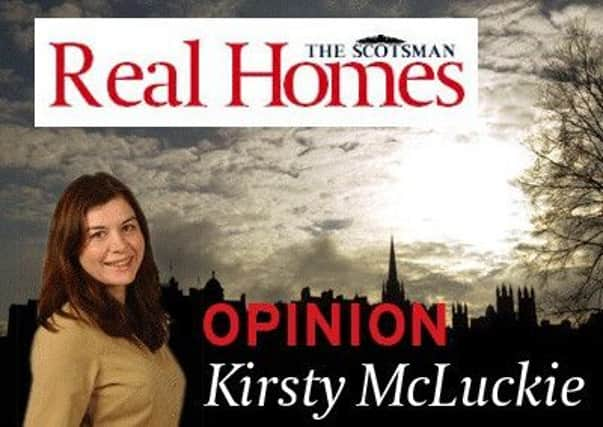Kirsty McLuckie: More funding for homes vital


While the rate of building in Scotland has increased, the number of new homes being created each year doesn’t come near the number required.
Industry insiders are attributing the upturn in building activity to the Scottish Government scheme designed to help first time buyers and those with small deposits, as well as benefitting the building industry.
Advertisement
Hide AdAdvertisement
Hide AdHomes for Scotland, the trade body of the sector, believes the Help to Buy (Scotland) shared equity scheme is the catalyst behind the 16 per cent increase in private sector home building seen during 2014.
They also pointed to a 22 per cent rise in the number of new homes built since 2012, the year before the scheme was introduced.
Chief Executive Philip Hogg has praised the scheme, reporting that in the last three years Help to Buy (Scotland) has resulted in 5000 sales and proved to have significantly increased housing production. He believes it has stimulated the building of exactly the type of new housing needed, helped people to own their own home and channelled investment to Scotland as a whole, supporting vital jobs and boosting the wider economy.
Help to Buy (Scotland), which in effect gives an interest free loan of 15 per cent of the purchase price of a new build property, means the buyer only has to come up with five per cent deposit, while being able to apply for an 80 per cent mortgage - which is likely to be more accessible and will have a much better rate than a higher proportion loan.
Similar schemes were introduced in the other parts of the UK and have been taken up with equal alacrity; there, however, the comparison ends.
While the constituent parts of the rest of the UK have legislated to extend their schemes beyond the initial period and have allocated greater amounts in response to the success and such clear benefits, the Scottish scheme has run out of money very quickly into each of the three years it has been operating.
This year’s tranche of funding was released at the beginning of April, but there was already of backlog of buyers waiting to complete and needing the scheme to do so - last year the money ran out in July. Demand so far has meant the main part of the scheme has already used up its finances for 2015/16 after just two months.
Philip Hogg says: “Disappointingly, with demand resulting in early closure of the main scheme just last week and no announcement on further support forthcoming from the Scottish Government, we now seem to be at risk of letting the opportunity to build on its success pass us by rather than capitalising on the wide-ranging social and economic benefits it has to offer.”
Advertisement
Hide AdAdvertisement
Hide AdHelp to Buy (Scotland) has its detractors - not least those homeowners trying to sell who found themselves competing with developers for buyers’ bids but couldn’t hope to offer the same deal. Elsewhere in the UK the schemes have covered purchases of existing properties as well as brand new homes so that disparity hasn’t happened. Anecdotal evidence suggest the disadvantage is particularly stark in large building projects where a homeowner may be trying to sell their two year old flat on which buyers have to raise their own finance package, in the same development as Help to Buy is offering a leg up on brand new properties. Including only brand new homes in the Scottish scheme has done nothing to help these first time sellers.
But in terms of benefits to the economy - providing more homes and more jobs, Help to Buy (Scotland) has delivered and seems vastly more important and value for money - if less iconic and high profile - than, for instance, saving a shipyard with a government contract.
We have had two years of stop/start recovery in the building industry because of this underfunded scheme and as yet another year’s money runs out not even half way through the year, we are likely to have a third. The industry are calling on ministers to extend the Help to Buy with a decent tranche of money.
For a scheme which seems to have such benefits to individuals, to the building industry and to the wider economy, it would be difficult to argue against their plea.